Angels in the Outfield

Brief Synopsis
Cast & Crew
Clarence Brown
Paul Douglas
Janet Leigh
Keenan Wynn
Donna Corcoran
Lewis Stone
Film Details
Technical Specs

Synopsis
In Pittsburgh, household hints reporter Jennifer Paige is assigned an article on the Pittsburgh Pirates from "the women's angle." Jennifer knows nothing about baseball, but soon learns that the Pirates are in a long losing streak. When two sports reporters goad her into interviewing Guffy McGovern, the team's ill-tempered manager, she is shocked to overhear the bad language he uses berating the team and writes a scathing article blaming him for the slump. The article is so successful that her editor keeps her on as a sports reporter, and she decides to find out more about the tempermental McGovern. One evening, when she approaches him in his favorite restaurant, he says he does not care what people write about him, despite a long-standing feud with Fred Bayles, the caustic former Pirates announcer, who now works for the New York Giants. McGovern slugs Bayles in the restaurant men's room, thus antagonizing him further. One night, after a particularly brutal loss in Boston, McGovern chasitises his players, especially aging pitcher Saul Hellman, a former friend. He then goes out to the diamond and is startled to hear a voice yell "shut up." The voice says he is an angel sent by Gabriel, who is answering someone's prayers. He tells McGovern that if he refrains from swearing, slugging and anger he will win some ball games, maybe even a pennant. To diffuse McGovern's skepticism, the voice tells him to look for a miracle the next day in the third inning. McGovern is convinced when Rube Ronson, ordinarily a terrible player, makes a great catch, then a ball hit by one of the Pirates temporarily disappears and they win the game. The team wins their next ten games and McGovern seems transformed, but when he starts to swear in the eleventh game, they lose. That night, the angel says he and his "boys," angelic former players, will help the Pirates when they are needed, but most of the time they will be on their own. During one game, Bridget White, a little girl from St. Gabriel's orphanage, excitedly tells her baseball-loving Mother Superior, Sr. Edwitha, that she sees angels behind each of the Pirates. Sr. Edwitha merely thinks that the girl has had too much sun, but when Jennifer hears about the incident, she writes about it in a column. After McGovern reads the story, he goes to the orphanage to talk to Bridget. He believes her story and is touched when she says that she has been praying for him to the angel Gabriel. That afternoon the game is rained out, and Jennifer goes to McGovern's apartment to apologize for her column, which is the talk of Pittsburgh. The next day, she offers to take Bridget to the ball game and keep her out of the sun so she can write a new article explaining that the heat made Bridget see things. Soon realizing that McGovern has a soft spot for Bridget, Jennifer begins to spend more time with him and brings Bridget to his apartment for his birthday dinner. Jennifer cleans up the apartment and makes a homey meal, but a kitchen mishap ruins the food and the three go to a restaurant. A drunken Bayles is at another table, and despite McGovern's best efforts, Bayles creates a scene and slugs McGovern. That night, McGovern asks Sr. Edwitha about adoption. She is sympathetic, but tells him that the courts usually prefer married couples to single people. The next day, after he is hit in the head with a baseball, a stunned McGovern jovially tells reporters that he talks to angels every day. Bayles accuses him of being "emotionally unstable" and does a televised interview with a Boston groundskeeper who observed McGovern's behavior on the deserted ballfield weeks before. McGovern becomes a laughing stock and even the players are concerned, except for Hellman, who defends his old friend. The night before McGovern must attend a hearing on his worthiness to continue with the Pirates, he talks to the angel and is shaken to learn that the cellestial team will soon be signing up Hellman. The hearing brings up two main points: are there angels, and can you talk to them? A pschyiatrist dismisses angels as superstition, but McGovern's expert witnesses, a minister, a priest and a rabbi, affirm their existence. Just as the baseball commissioner is about to rule, Sr. Edwitha brings Bridget in to testify, at the girl's insistence. When Bayles then makes a crack about McGovern's recent filing of intent to adopt Bridget, McGovern slugs him and a melée ensues. A lightning crack interrupts the brawl, and as a feather floats down, the commissioner dismisses the case. On the way to the ballpark, the angel tells McGovern that the punch cancelled their deal and now he is on his own. At the start of the game, McGovern selects Hellman to pitch, over the protests of the fans; despite Hellman's exhaustion, he pitches a winning game, and the Pirates win the pennant. That night, McGovern, Jennifer and Bridget, who will soon be a family, walk happily out of the ballpark, thinking of the great ball players who might be playing on the heavenly champs team.

Director

Clarence Brown
Cast

Paul Douglas

Janet Leigh

Keenan Wynn

Donna Corcoran
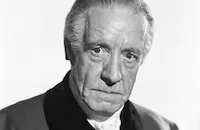
Lewis Stone

Spring Byington
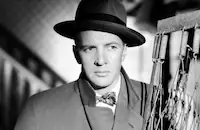
Bruce Bennett

Marvin Kaplan

Ellen Corby

Jeff Richards
John Gallauder

King Donovan
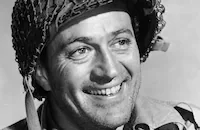
Don Haggerty
Paul Salata
Fred Graham
John Mckee
Patrick J. Molyneaux
Joe Di Maggio
Ty Cobb
Harry Ruby

Bing Crosby
Dick Simmons
Dan Riss
Richard Hale
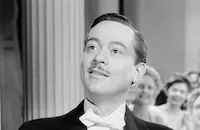
John Eldredge
Tudor Owen
Larry Dobkin

Douglas Fowley
Billy Wayne

James Whitmore
Jake Lebec
Billy Miller
Jack Snyder
John Downey
Steve Borowitz
Tom Irish
Eddie Parks

Bill Walker
Barbara Billingsley
J. R. Fuchs
Hubie Kerns
Kenny Swanson
Pat Flaherty
Lefty Kendall
John "red" Burger
Sam Neron
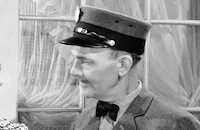
John Butler
Ralph Montgomery
Judy Nugent
Beverly Mook
J. Lewis Smith
Fred Santley
Harry Cody
Bill Hickman
Fred Datig Jr.
Harry Hayden
Harold "pie" Traynor
Paul Waner
Crew
Daniele Amfitheatrof
Peter Ballbusch
Clarence Brown
Richard Conlin
Cedric Gibbons
Arnold Gillespie
Sydney Guilaroff
Hugh Hunt
Robert J. Kern
Dorothy Kingsley
Howard W. Koch
Jay Marchant
Warren Newcombe
Douglas Shearer
Sister Frances
Sister Henrietta
Harold "pie" Traynor
William Tuttle
Paul C. Vogel
George Wells
Edwin B. Willis

Photo Collections
Videos
Movie Clip



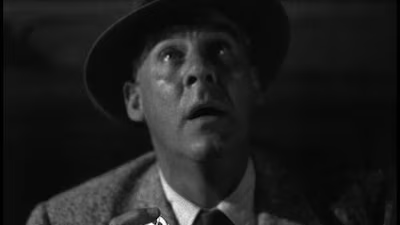
Trailer
Hosted Intro
Film Details
Technical Specs

Articles
Angels in the Outfield (1951)
Paul Douglas plays Guffy McGovern, the gruff, foul-mouthed manager of the perpetually losing Pirates. But one night after a game he runs into the Archangel Gabriel on the second base line. The invisible messenger, spokesman for the "Heavenly Choir Nine," tells Guffy to look for a miracle in tomorrow's game. When the team suddenly wins, Guffy knows he's getting some divine help, but he stays mum about it. Then a pretty blonde newspaper reporter (Janet Leigh) is assigned to cover the sport from "the women's angle" and she interviews a little orphan girl from St. Gabriel's Parish who attends games with some baseball-loving nuns. The child swears she can see an angel standing beside each Pirate player as if in answer to her prayers to help the team win. When Guffy is beaned by a line drive, he suddenly opens up about his deal with heaven, and a vindictive sportscaster (Keenan Wynn) that Guffy had fired from the Pirates announcers booth starts a smear campaign against the manager that results in a baseball commission hearing on the day of the crucial pennant game.
Douglas was a rather unlikely candidate for stardom, but for a few years in the late '40s to mid-50s, this burly middle-aged guy enjoyed a good measure of popularity with movie audiences. A former pro football player and radio sports announcer, Douglas made his name on Broadway playing mobster Harry Brock in the comedy Born Yesterday. Although he had made his movie debut at the age of 42 in A Letter to Three Wives (1949) and made two other pictures that year, including another baseball fantasy-comedy It Happens Every Spring (1949), he turned down the film version of Born Yesterday (1950). But that decision didn't set him back; a string of pictures followed, often comedies in which he made bearish bluster humorous and appealing. Although it was one of his most popular films, Douglas once described Angels in the Outfield as "a pretty crummy movie," but after his death in 1959, his widow, actress Jan Sterling, insisted he had been kidding.
One aspect of the McGovern character that presented a problem for the studio was his frequent unabashed swearing. Putting words like "fudge" and "darn" in his mouth would have been ludicrous and out of character. So the MGM sound department came up with the idea of having Douglas mouth the epithets then record them backwards on the soundtrack so they sounded like gibberish. At least that was the story that went out. But Hal Erickson, author of the book Baseball in the Movies (McFarland and Co.), claimed he taped a swearing scene on reel-to-reel and ran it backwards, only to discover that the lines still sounded like gibberish. Apparently, MGM wasn't taking any chances that some smart-aleck projectionist might flip the reverse switch. Douglas' gruff performance also did much to make the character's tendency to curse convincing. In one scene, Guffy gets into a heated argument with an umpire, but because he's vowed to abstain from swearing, he substitutes quotes from Shakespeare for the curses.
Much of the film was shot on location - unusual for the time - at the Pittsburgh ball field (with some shots done at Los Angeles' Wrigley Field) using actual Pirates game footage. A touch of comic reality was also injected by using baseball legends Ty Cobb and Joe DiMaggio, songwriter Harry Ruby, and Bing Crosby (who owned 15% of the actual Pittsburgh Pirates) as themselves in mock interview sequences. Also check the cast for Ellen Corby (the future Grandma Walton of TV's The Waltons) as a sports-fan nun, Lewis Stone (Judge Hardy from the popular Mickey Rooney series) as the baseball commissioner, and Barbara "June Cleaver" Billingsley in an uncredited bit as a hat check girl.
Because distributors didn't think European audiences would catch the baseball reference to "outfield" in the title, the picture was renamed for foreign distribution. Apparently no thought was given to whether audiences paying to see The Angels and the Pirates would be expecting a swashbuckling adventure story.
Producer/Director: Clarence Brown
Screenplay: Dorothy Kingsley, George Wells, Richard Conlin
Cinematography: Paul Vogel
Editing: Robert J. Kern
Art Direction: Edward Carfagno, Cedric Gibbons
Original Music: Daniele Amfitheatrof
Cast: Paul Douglas (Guffy McGovern), Janet Leigh (Jennifer Paige), Keenan Wynn (Fred Bayles), Donna Corcoran (Bridget White), Lewis Stone (Arnold P. Hapgood), Bruce Bennett (Saul Hellman).
BW-100m. Closed captioning.
by Rob Nixon

Angels in the Outfield (1951)
Quotes
Trivia
hat check girl
The player wearing number 4 who hits a homerun is Ralph Kiner who was known as a pretty good hitter.
Notes
The film's working titles were Angels and the Pirates and The Angels and the Pirates. The film included the following written prologue: "Through the kind cooperation of the Pittsburgh 'Pirates' we have used the team and its ball park to tell our story. But we do not depict any real characters or actual events. This could be any baseball team, in any league, in any town in America." In the opening cast credits, Donna Corcoran's name appears last, but in the end credits, she is listed fourth. The film is intermittently narrated by Janet Leigh as "Jennifer Paige."
Like their namesakes in the film, the real Pittsburgh Pirates had not won a National League pennant since 1927; their next pennant victory was in 1960, when they went on to win the World Series against the New York Yankees. Hollywood Reporter news items and M-G-M press releases contained the following information on the film: Richard Conlin was the pen name of Jesuit priest Fr. Grady [first name undetermined], who turned over the proceeds from the sale of his original story to his church. Branch Rickey, then vice-president and general manager of the Pittsburgh Pirates, and producer-director Clarence Brown negotiated to have the picture shot primarily on location in Pittsburgh, PA, where the film's world premiere was held. Clark Gable was originally cast in the lead role and Sheila James was tested for "Bridget White." Angels in the Outfield marked the screen debut of Corcoran, whose father was an M-G-M maintenance department employee.
Wallace Ford was sought for an unpsecified role but was not in the film. Jonathan Cott, Bob Simpson, Bob DeLauer and baseball players Babe Herman and Lee Handley were cast, but their appearance in the released film has not been confirmed. The extensive location filming in Pittsburgh, PA included shots of Pittsburgh streets and Forbes Field, home of the Pittsburgh Pirates. Additional baseball sequences were filmed at Wrigley Field in Los Angeles. Cameo appearances were made by baseball greats Joe Di Maggio and Ty Cobb, songwriter Harry Ruby and actor-singer Bing Crosby, who at that time was a part-owner of the team. The guest stars commented on whether or not angels were helping the Pirates. Some baseball sequences in the film featured players from the Cincinnati Reds, the St. Louis Cardinals and the Philadelphia Phillies baseball teams.
Leigh and Corcoran recreated their roles for a Lux Radio Theatre broadcast on April 6, 1953, but Douglas' role was taken over by George Murphy. The story was remade by The Walt Disney Company in 1994, directed by William Dear and starring Danny Glover and Joseph Gordon-Levitt. That film featured the California Angels baseball team and was set in Anaheim, CA. A 1997, football-themed sequel to the Disney film, entitled Angels in the Endzone, was released as a movie for television.

Miscellaneous Notes
Nominated for Excellence in Media's 1994 Golden Angel Award for best family film.
Released in United States 1951
Remake of Clarence Brown's "Angels in the Outfield" (USA/1951).
Began shooting October 5, 1993.
Completed shooting December 11, 1993.
Released in United States 1951















